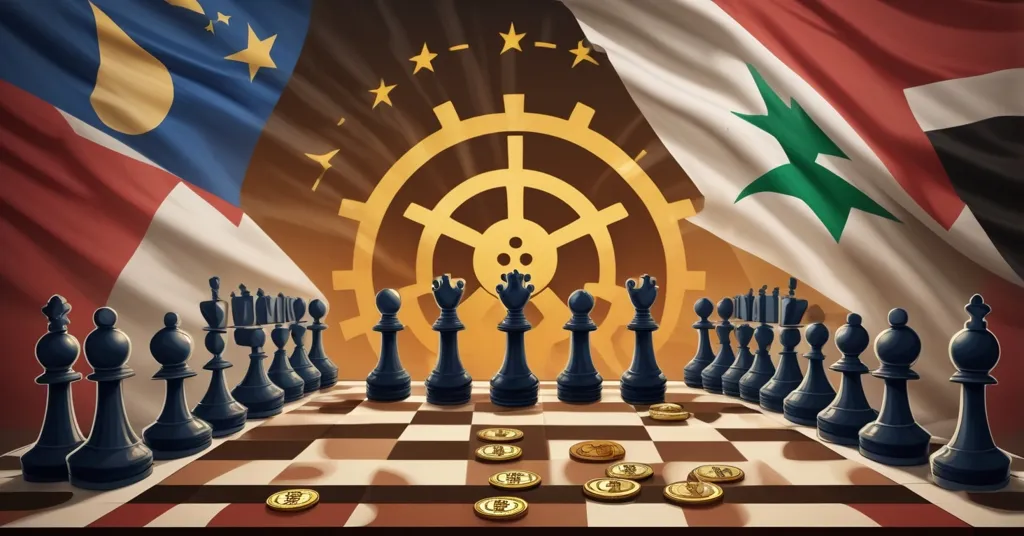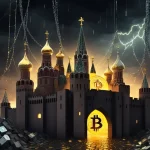Europe Delays Iran UN Sanctions: Nuclear Talks and Crypto’s Risky Role

Europe’s Sanctions Play: Delaying UN Penalties to Push Iran Toward Talks—Crypto’s Double-Edged Role
Europe is making a bold move to delay UN sanctions on Iran, hoping to coax Tehran back to the negotiating table with the US and into cooperation with nuclear inspectors. As deadlines loom and the shadow of a nuclear-armed Iran threatens global stability, this diplomatic chess game could ripple through financial systems, potentially amplifying the role of Bitcoin and decentralized technologies in sanctioned economies like Iran’s. Let’s unpack this high-stakes drama and what it means for the future of money.
- European Proposal: The E3 (Britain, France, Germany) offers to hold off UN sanctions past mid-September and key October 18 deadlines if Iran resumes talks with the US and works with the IAEA.
- Nuclear Risks: Over 400 kilograms of highly enriched uranium remain unaccounted for, and Iran’s nuclear program, though damaged by Israeli strikes, poses ongoing proliferation fears.
- Crypto Connection: Sanctions pressure could drive Iran deeper into Bitcoin and blockchain solutions, but with serious risks of misuse tainting the space.
The E3’s High-Stakes Offer: Diplomacy Over Coercion?
The E3—Britain, France, and Germany—has thrown down a calculated gauntlet: they’re willing to delay the reimposition of UN sanctions on Iran if Tehran restarts negotiations with the US and allows inspectors from the International Atomic Energy Agency (IAEA) to verify its nuclear activities. For those unfamiliar, the IAEA is the UN’s nuclear watchdog, tasked with ensuring countries don’t sneak materials or tech toward building weapons. This proposal comes ahead of a mid-September deadline and the critical October 18 expiration of key clauses from the 2015 nuclear deal, known as the Joint Comprehensive Plan of Action (JCPOA). That deal, once a linchpin of global diplomacy, aimed to limit Iran’s nuclear ambitions in exchange for sanctions relief—but it’s been in tatters since the US pulled out under Donald Trump in 2018. For more on this diplomatic move, check out the details on Europe’s proposal to delay sanctions.
The E3’s stance isn’t a blank check. It’s a pragmatic nudge toward dialogue, with a big “if” attached. A Western diplomat summed it up without mincing words:
“If Iran comes to the table and works with inspectors, we hold off. If not, sanctions are back on.”
Here’s the catch: Iran’s Deputy Foreign Minister Kazem Gharibabadi has floated a vague “new modality” for cooperating with the IAEA, but explicitly dodged committing to actual site access. That’s diplomatic speak for stalling—and frankly, it’s nonsense. Without boots on the ground at places like Natanz or Fordo, how can anyone trust what’s happening behind closed doors? Meanwhile, the E3 is also weighing a “snapback” mechanism from the 2015 deal—a rule that lets UN sanctions automatically return if Iran doesn’t comply, no extra votes needed. They’ve signaled they’re not triggering it yet, per recent statements, but the threat looms large ahead of a pivotal meeting in Istanbul. For a deeper look at the E3’s position, see this update on the sanctions delay proposal.
A Messy Backstory: How We Got Here
To grasp why this matters, let’s hit the rewind button. The JCPOA was hailed as a breakthrough when signed in 2015, curbing Iran’s ability to enrich uranium to weapons-grade levels while easing economic sanctions that had throttled its economy. It wasn’t perfect, but history shows diplomacy worked better than sabotage or strikes at slowing Iran’s nuclear march. Then came 2018: Trump tore up the deal, hit Iran with brutal sanctions, and Tehran responded by cranking up uranium enrichment far beyond agreed limits—edging closer to the 90% purity needed for bombs. Cooperation with the IAEA dwindled, and tensions skyrocketed. You can explore the broader context of these international sanctions on Iran’s nuclear program for a full historical overview.
Fast forward to recent months, and the plot’s thicker than a bad crypto whitepaper. Israel launched a 12-day military offensive against Iran, briefly involving the US, targeting key nuclear sites like Natanz, Fordo, and Isfahan. Centrifuges—those spinning machines that enrich uranium—were smashed, electrical systems fried, and Iranian military leaders and scientists killed. Trump, never one for subtlety, crowed that Iran’s nuclear sites are “destroyed” and he’s in “no rush” to talk, tossing out a blunt:
“It’s Tehran that needs to come back.”
But the damage assessment isn’t so clear-cut. Some IAEA analysts warn Iran could be back enriching uranium “in a matter of months,” while others, like former Pentagon official Mick Mulroy, peg the setback at 2-5 years due to wrecked infrastructure. That gap in expert takes screams uncertainty—hardly comforting when over 400 kilograms of highly enriched uranium, enough for several nukes, remains unaccounted for. Suspicions are it was stashed before the strikes, fueling nightmares of proliferation. For more on this alarming development, read about the missing uranium reported by the IAEA. Add Iran’s threat to ditch the Non-Proliferation Treaty (NPT)—a global pact to stop nuclear weapon spread—if sanctions return, and you’ve got a recipe for chaos.
Oh, and let’s not forget the side hustle: Iran’s been chatting with Russia and China in separate talks, though don’t expect a press release on what they’re cooking up. The E3 isn’t thrilled, especially given Iran’s supply of drones to Russia for use in Ukraine and whispers of ballistic missile transfers. This isn’t just about nukes; it’s a geopolitical dumpster fire that could torch oil markets (Iran’s a major producer) and shake fiat currencies. Which brings us to where Bitcoin and decentralized tech enter the fray.
Iran’s Crypto Lifeline: Freedom or Pandora’s Box?
For years, Iran’s been under the boot of US-led sanctions, cut off from global banking systems like SWIFT. Their workaround? Bitcoin and other cryptocurrencies. With dirt-cheap electricity, Iran’s become a mining powerhouse—estimates from 2021 pegged them at 4-6% of global Bitcoin hashrate, raking in upwards of $1 billion annually. They’ve used decentralized networks for cross-border trade, swapping crypto for goods when banks won’t touch them. It’s like using a peer-to-peer marketplace to barter directly when PayPal locks you out. If UN sanctions snap back, expect this trend to go into overdrive. Tehran could lean harder on Bitcoin as a middle finger to centralized financial control, embodying the decentralization ethos we champion. Learn more about Iran’s history with Bitcoin mining under sanctions.
But let’s not pop the champagne just yet. This isn’t a fairy tale of crypto saving the day—there’s a dark underbelly. That missing 400 kilograms of uranium isn’t pocket change; it’s a proliferation red alert. Untraceable transactions on blockchain networks, especially with privacy coins like Monero or Zcash, could fund illicit activities faster than you can say “Silk Road 2.0.” Look at North Korea: they’ve reportedly laundered millions in crypto to bankroll nuclear programs. Iran following suit isn’t a stretch, and that risks staining the entire space. We’re not here to shill hopium about Bitcoin mooning to $1 million off geopolitical chaos—those price predictions are mostly garbage anyway. The messy truth is decentralization empowers both freedom fighters and bad actors. Where’s the line? For community insights, see this Reddit discussion on Iran’s Bitcoin mining.
Could Blockchain Fix Nuclear Transparency?
The IAEA’s struggle to even peek inside Iranian sites post-strikes—inspections are suspended during wartime, and physical access to damaged facilities is a question mark—exposes a glaring hole in global governance. Traditional diplomacy’s failing when trust is this low. So, here’s a wild thought: what if blockchain tech stepped in? Picture a decentralized, immutable ledger tracking nuclear materials or logging inspection data, timestamped and verifiable by all nations. No fudging numbers, no “trust me, bro” from Tehran. Ethereum smart contracts could automate compliance checks, cutting reliance on centralized bodies prone to politics. Sure, it sounds like sci-fi today—good luck getting Iran to sign up—but isn’t disruption about dreaming big and accelerating solutions?
This aligns with the effective accelerationism we vibe with: push tech to solve broken systems, fast. Bitcoin maximalists might scoff—BTC isn’t built for this niche—but altchains like Ethereum show how diverse protocols fill gaps. The counterpoint? Tech isn’t a silver bullet. State actors could game any system, and blockchain’s permanence cuts both ways if bad data gets baked in. Still, it’s a conversation worth having when 400 kilograms of weapons-grade material are MIA. For perspectives on how Iran navigates such restrictions, check this Quora thread on bypassing sanctions with Bitcoin.
Global Fallout: Why Crypto Enthusiasts Should Care
Zooming out, this standoff isn’t just Middle East drama—it’s a potential shockwave for financial systems. If Iran exits the NPT or tensions spike further, a regional arms race could erupt, jacking up oil prices and destabilizing fiat markets. Bitcoin’s often pitched as a hedge in such chaos, a store of value when currencies wobble. And yeah, as maximalists, we’d argue BTC’s battle-tested network outshines altcoins for sheer resilience under scrutiny. But let’s be real: Ethereum-based stablecoins could facilitate trade for Iran, while privacy coins offer anonymity BTC can’t. Each has a role, even if we’re rooting for Bitcoin to lead the charge. See how these tensions are already affecting markets in this report on crypto volatility tied to Iran’s nuclear sanctions.
The flip side? State-driven crypto adoption in sanctioned economies often comes with regulatory heat. Global watchdogs like the FATF (Financial Action Task Force) already eyeball crypto for money laundering risks. If Iran’s blockchain activity spikes, expect more crackdowns—potentially on all of us. Plus, market volatility from oil shocks might pump BTC’s price short-term, but we’re not here to peddle baseless “to the moon” hype. The focus is sovereignty and freedom, not gambling on chaos.
Key Takeaways and Questions
- What’s the deal with Europe delaying UN sanctions on Iran?
The E3 (Britain, France, Germany) is pushing to hold off sanctions past mid-September and October 18 deadlines tied to the 2015 nuclear deal, but only if Iran restarts talks with the US and cooperates with IAEA inspectors. - How has Iran historically used Bitcoin under sanctions?
Iran leverages cheap power for Bitcoin mining (once 4-6% of global hashrate) and uses crypto for cross-border trade, bypassing banking restrictions—a strategy likely to grow if sanctions tighten. - What risks come with Iran’s crypto reliance?
While decentralization offers economic freedom, untraceable transactions via Bitcoin or privacy coins like Monero could fund illicit activities, especially with 400 kilograms of uranium unaccounted for, mirroring North Korea’s playbook. - Could blockchain address nuclear monitoring gaps?
A decentralized ledger, like Ethereum smart contracts, could log inspection data or track materials transparently, bypassing flawed centralized systems—though it’s a long shot for now. - How might this crisis impact global markets and crypto?
Escalation could spike oil prices and shake fiat currencies, driving interest in Bitcoin as a hedge, though wild price predictions are mostly hype we won’t entertain. - What’s the broader significance for decentralization advocates?
Iran’s potential crypto pivot under sanctions showcases decentralization’s power to challenge control, but also its dark side when state actors exploit it, testing the ethos of freedom versus responsibility.
So, where do we stand? The E3’s gamble to delay sanctions is a tightrope act—de-escalation versus enforcement—with Iran holding cards it might not even show. For Bitcoin purists and decentralization fans, this saga screams the raw potential of borderless money to upend oppressive systems. Yet it’s a gut punch reminding us that freedom’s tools don’t pick their wielders. As deadlines near, the world holds its breath, and the crypto space braces for shockwaves. No fluff, just facts: this nuclear standoff is as much about geopolitics as it is about the future of finance. Where do you draw the line when decentralization meets global chaos?



